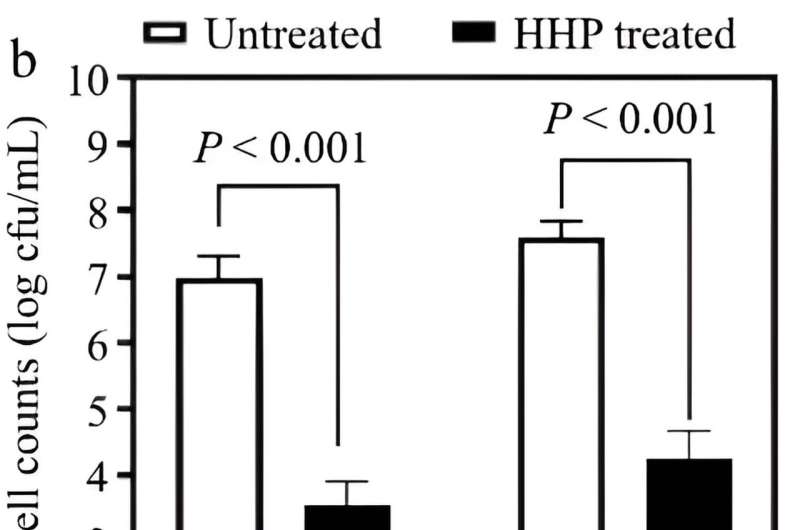This article has been reviewed according to Science X's editorial process and policies. Editors have highlighted the following attributes while ensuring the content's credibility:
fact-checked
proofread
The role of high hydrostatic pressure in altering bacteria in donkey milk

Donkey milk is popular for its nutritional content and hypoallergenic properties and can be used as an alternative nutritional product for people who are allergic to cow's milk proteins or are immunocompromised. The bacterial composition of donkey milk can affect its safety and quality, with conventional pasteurization heat treatment leading to changes in nutrient composition while heat-resistant bacteria remain. In order to ensure the food safety of donkey milk, it is necessary to study the effect of high hydrostatic pressure (HHP) treatment on the microbial composition of donkey milk.
Food Innovation and Advances
published a paper titled "Effects of high hydrostatic pressure treatment on bacterial composition in donkey milk studied by high throughput sequencing" on 17 April 2023.
This study explored the microbial landscape of donkey milk, researchers employed culture-dependent methods to examine the growth of microbial populations. Initial observations showed that the total bacterial count increased to 5.71 log cfu/mL , 6.87 log cfu/mL and 8.21 log cfu/mL after 5, eight and 12 hours of incubation, respectively. Since the number of dead cells in donkey milk increased as the microorganisms entered a stable growth period, samples incubated for eight and 15 hours were selected for subsequent HHP treatments.
HHP application on these samples revealed a remarkable bacterial reduction, demonstrating a decrease of approximately 3–4 log cfu/mL (P high-throughput sequencing (HTS). This analysis illuminated distinct microbial shifts: both untreated and HHP treated samples predominantly harbored Proteobacteria.
However, HHP decreased the abundance of Pseudomonadaceae and Moraxellaceae (23.88% vs. 19.42%) by 4.92% and 4.46%, respectively, whereas Enterobacteriaceae and Erwiniaceae increased their proportions at the family level by 6.77% and 0.83%, respectively. The effect of HHP treatment on microbial composition and its inactivation of pathogens was revealed through a combination of culture-dependent and HTS methods, making it a promising tool for microbial management of donkey milk.
In conclusion, this study emphasizes the efficacy of high hydrostatic pressure treatment in enhancing the safety of donkey milk without compromising its nutritive elements. These findings reveal innovative approaches to donkey milk processing, paving the way for safer consumption and potentially broadening the market appeal of donkey milk and applications in the food industry.
More information: Jiaqi Kong et al, Effects of high hydrostatic pressure treatment on bacterial composition in donkey milk studied by high throughput sequencing, Food Innovation and Advances (2023). DOI: 10.48130/FIA-2023-0010
Provided by TranSpread

















